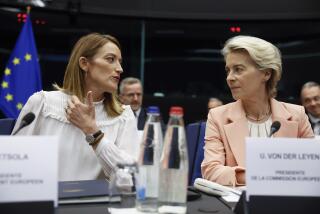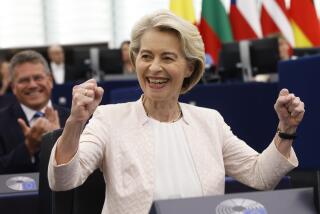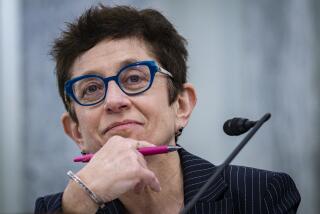Italian Withdraws Controversial Candidacy for EU Post
ROME — Under attack for criticism of homosexuals and single mothers, Italy’s Rocco Buttiglione said Saturday that he was withdrawing his nomination as European Union justice commissioner, a candidacy that had kept the new EU Commission from taking office.
Buttiglione defended his religious beliefs nevertheless, insisting that they would not have affected his work.
During a confirmation hearing this month, Buttiglione said that he considered homosexuality “a sin” and that marriage existed “to allow women to have children and to have the protection of a male.”
A committee in the European Parliament objected to Buttiglione’s nomination because of his conservative views. Under EU guidelines, the Parliament cannot reject individual nominees for the 25-seat executive commission, but must vote on the group as a whole.
With the commission facing rejection, the new EU top executive, Commission President Jose Manuel Durrao Barroso, withdrew all 25 nominees to gain time to find a solution.
“I am ready to step aside, to resign, to favor the path of the Barroso commission, which I wish every success,” Buttiglione said at a news conference Saturday.
Buttiglione depicted himself as a victim of an “ably orchestrated campaign,” but declined to elaborate. He said his criticism of homosexuals and single mothers had been taken out of context.
“I have the right to think that homosexuality is a sin, but this has no effect on politics because in politics, the principle of nondiscrimination prevails, and the state has no right to stick its nose in these situations,” Buttiglione told reporters.
A former philosophy professor, Buttiglione, 56, is a devout Catholic and friend of Pope John Paul II. He also holds the post of EU affairs minister in Berlusconi’s government.
Italian state radio said Italy might tap Foreign Minister Franco Frattini for the commission post. Deputy Prime Minister Gianfranco Fini might then fill the Foreign Ministry slot.
“The Parliament has obtained what it wanted,” said Marco Incerti, a research fellow at the Center for European Policy Studies in Brussels.
More to Read
Sign up for Essential California
The most important California stories and recommendations in your inbox every morning.
You may occasionally receive promotional content from the Los Angeles Times.










